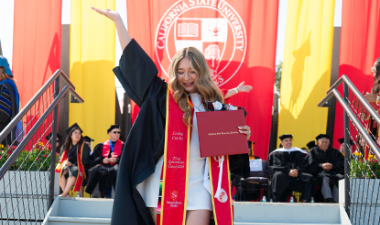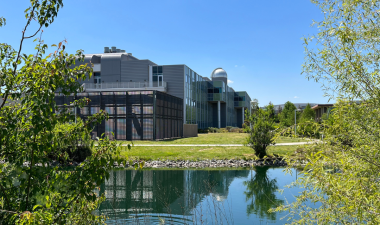Delhi Medical Academy of Science students will soon be able to able to attend conferences and labs at Stanislaus State, enroll in a new medical biology course at their school, work with $50,000 worth of new lab equipment and have access to a Stan State mentor who graduated from their program.
Meanwhile, Modesto High School and Stan State students pursuing careers in education spent nearly a week in Washington, D.C., this summer attending the national Educators Rising conference.
All are funded by WE WILL! grant money awarded to Professor of Biological Sciences Mark Grobner and Assistant Professor of Education Ana York.
Phase 2 of WE WILL!, which is part of the K-16 Education Collaboratives Grant Program covering Stanislaus, San Joaquin and Merced counties, supports pathways to higher education and careers in healthcare and education. This phase is offering up to $200,000 for each new proposal.
Applications are due by Oct. 1, with funding running through June 2026, including awards from the first round earlier this year.
“The deadline’s coming up,” said Associate Vice President of Student Equity and Success Julie Sedlemeyer. “If applicants have questions or want support, they can reach out to me or Associate Vice President of Academic Affairs and Vice Provost Stuart Wooley, and we’d be happy to meet with them. The application process isn’t difficult. It’s a quick form.”
While healthcare and education are the two fields of focus for WE WILL! based on the regional workforce needs, Sedlemeyer said other disciplines play a role in creating pathways into those fields.
“Applicants should be thinking about how classes they teach or programs they run help people interested in these pathways,” Sedlemeyer said. “How does math fit in? English is going to matter. Faculty may have to connect the dots to show how that is happening, but it can be done, especially if they have partners. These funds can be used for dual enrollment if you’re teaching a class at a high school.”
Part of Grobner’s $276,000 grant will launch a biotechnology class in the Delhi program that he has supported for nearly 10 years.
“Delhi Medical Academy of Science is trying to develop what students need to know to be successful in college, so they can go on into professional health careers,” Grobner said. “This was a pathway program they developed, and it seemed like a perfect opportunity to apply and write this grant to continue that work.”
Delhi High School received a $5 million grant to launch the program, which included construction of a new facility on the high school campus, but the funds ran out before the COVID-19 pandemic.
Even after the original grant money was depleted, except during the pandemic, Grobner invited Delhi students to campus at least once every semester for lab activities with Stan State students.
“With this grant, it’s easier to do that, because we now have money to buy the materials we need,” Grobner said.
He’s planned three conferences and is especially excited about the new medical biotech course to be offered at Delhi. Heather Frieberg, a former Stan State STEM Ambassador and high school biology teacher at Modesto’s Enochs High School, is assisting in developing the course with her expertise in teaching high school biotech.
“Hopefully we’ll get more students interested,” Grobner said. “Biotech is the new buzzword. Maybe if they did some hands-on work, that would get them more excited about their high school education. Maybe this will open their eyes to a field that may not turn them into doctors but could show them there are a lot of other areas for people with that background.”
Like Grobner’s health science grant, York’s is directly related to one of the two targeted fields.
A veteran of 25 years of K-12 teaching, York learned about Educators Rising while recruiting Black, Indigenous and People of Color (BIPOC) students for another grant.
She started an Educators Rising club at Modesto High School and started the Aspiring Educators at Stan State.
“Later, I want to start more chapters, like at Modesto Junior College,” York said. “The goal is that if these high school students want to become educators, when they get to community college or come here, there’s a club and they have support, so they don’t feel lost. Someone can tell them what classes they need, what they need to do, who they need to talk to and explain what the credential program looks like.”
The WE WILL! Grant enabled York to take 42 people to Washington, D.C., in June for the first of three annual trips to the national conference.
Applications to apply for the next round of funding are available online or by contacting Sedlemeyer at (209) 667-3645 or jsedlemeyer@csustan.edu.
Additionally, an all-partner collaboration meeting at Stan State is scheduled for Sept. 26, bringing together education and professional partners of WE WILL! The informational program will run from 9 a.m. to 3 p.m. in the Event Center.



